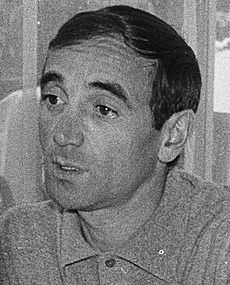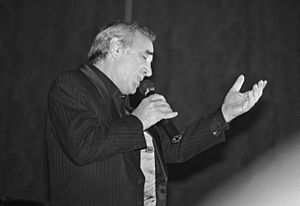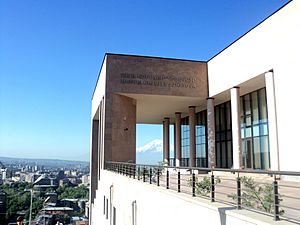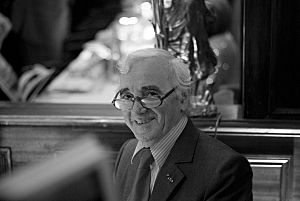Charles Aznavour facts for kids
Quick facts for kids
Charles Aznavour
|
|
|---|---|
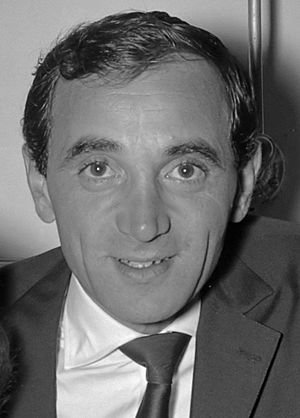
Aznavour in 1961
|
|
| Born |
Shahnour Vaghinag Aznavourian
22 May 1924 Paris, French Third Republic
|
| Died | 1 October 2018 (aged 94) Mouriès, France
|
| Burial place | Montfort-l'Amaury (Yvelines), France |
| Occupation |
|
| Years active | 1933–2018 |
| Spouse(s) |
Micheline Rugel
(m. 1946; div. 1952)Evelyne Plessis
(m. 1956; div. 1960)Ulla Thorsell
(m. 1967) |
| Children | 5, including Seda |
| Awards |
|
| Musical career | |
| Genres | |
| Labels | |
Charles Aznavour (born Shahnour Vaghinag Aznavourian; 22 May 1924 – 1 October 2018) was a famous French-Armenian singer, songwriter, actor, and diplomat. He was known for his unique singing voice, which could be clear and high, but also deep and raspy.
Over his amazing 70-year career, he recorded more than 1,200 songs in nine languages. He also wrote or helped write over 1,000 songs for himself and other artists. Many people consider Aznavour one of the greatest songwriters ever and a huge star of the 20th century.
He was one of France's most loved singers, sometimes called "France's Frank Sinatra". A music critic even called him a "French pop deity," meaning a pop music legend. He was also probably the most famous Armenian person of his time. In 1998, CNN and Time Online users named him the "Entertainer of the Century," beating out stars like Elvis Presley and Bob Dylan.
Aznavour sang for presidents, popes, and even royalty. He also performed at events to help people. After a big earthquake hit Armenia in 1988, he started a charity called Aznavour for Armenia. In 2008, he became an Armenian citizen. The next year, he was made Armenia's ambassador to Switzerland and its representative to the United Nations in Geneva.
He started his last world tour in 2014. On 24 August 2017, Aznavour received a star on the Hollywood Walk of Fame. Later that year, he and his sister, Aida Aznavourian, were given the Raoul Wallenberg Award for helping to hide Jewish people during World War II. His concert in Osaka, Japan, on 19 September 2018, was his very last performance.
Between 1974 and 2016, Charles Aznavour earned about sixty gold and platinum records worldwide. This means he sold millions of copies of his music. He was one of the few French artists to get a special award from the Recording Industry Association of America. When he passed away, his record company said he had sold over 180 million recordings in total.
Contents
Early Life and Family
Aznavour was born in Paris, France, into a family of artists. His birth name was Shahnour Vaghinag Aznavourian. His parents, Michael and Knar, were Armenian immigrants. His mother had survived the Armenian genocide.
Charles had an older sister named Aïda. His father, whose own father was a cook for Tsar Nicholas II, sang in restaurants. Charles's parents encouraged him to perform from a young age. He left school at nine years old to focus on his stage career, and that's when he started using the stage name "Aznavour."
Helping During World War II
During World War II, when Germany occupied France, Aznavour and his family bravely hid many people who were being hunted by the Nazis. Charles and his sister Aida were actively involved in helping these people escape danger.
In 2017, the President of Israel, Reuven Rivlin, recognized their heroic actions. That same year, Aznavour and Aida received the Raoul Wallenberg Award for their efforts during the war. The Aznavour family was connected to the Missak Manouchian Resistance Group. They offered a safe place in their Paris apartment to Armenians, Jews, and others, even though it put their own lives at risk.
Career
Musical Journey
Charles Aznavour was already used to performing on stage before he became a musician. When he was nine, he acted in a play and a movie. Later, he became a professional dancer and performed in many nightclubs.
In 1944, he teamed up with actor Pierre Roche. They performed together in many clubs. This partnership led Aznavour to start writing and singing his own songs. His first song, called J'ai Bu, was written in 1944. Their first big successes happened in Canada between 1948 and 1950.
Early in his career, Aznavour performed before the famous singer Edith Piaf. Piaf encouraged him to become a singer and helped him develop his unique voice.
Aznavour often sang about love. He wrote or co-wrote musicals and more than a thousand songs. He recorded ninety-one studio albums! His voice was special because it could reach high notes like a tenor, but also had the deep, rich sound of a baritone.
He could speak and sing in many languages, including French, English, Italian, Spanish, German, Russian, and Armenian. This allowed him to perform in famous places like Carnegie Hall in the US and other big venues worldwide. One of his most successful songs in the mid-1960s was "Que C'est Triste Venise" (How Sad Venice Can Be), which he sang in five different languages.
In 1972, he released an album with two classic songs: "Les plaisirs démodés" (Old-Fashioned Pleasures) and "Comme ils disent" (As They Say). The latter song was very brave for its time because it talked about homosexuality, which was not openly discussed back then.
In 1974, Aznavour became very popular in the United Kingdom. His song "She" was the number one song for four weeks! Another well-known song in the UK was "The Old Fashioned Way" from 1973.
Many famous artists have recorded his songs or worked with him. These include Édith Piaf, Frank Sinatra, Andrea Bocelli, Ray Charles, Bob Dylan, Liza Minnelli, and Elton John. Elvis Costello recorded "She" for the movie Notting Hill. One of Aznavour's close friends and musical partners was the Spanish opera singer Plácido Domingo.
In 2006, Aznavour began what he called his "farewell tour." He performed in the US, Canada, Japan, and across Asia. He also returned to Paris for many shows. Even though he said it was a farewell tour, he kept performing worldwide for many more years! He would often sing in two or three languages during his concerts. On 30 September 2006, he gave a big concert in Yerevan, the capital of Armenia, with the presidents of Armenia and France in the audience.
In 2008, he released an album called Duos, where he sang with many of his famous friends like Céline Dion, Sting, and Plácido Domingo. In 2009, he released Charles Aznavour and The Clayton Hamilton Jazz Orchestra, which featured new jazz versions of his classic songs.
After the terrible 2010 Haiti earthquake, Aznavour and Senegalese singer Youssou N'Dour, along with over 40 French artists, recorded a charity song called 1 geste pour Haïti chérie (A gesture for beloved Haiti).
Aznavour continued to tour around the world, even in his late 80s and 90s. His last concert was in Osaka, Japan, on 19 September 2018.
Film Appearances
Aznavour also had a long and successful career as an actor. He appeared in over 80 films and TV movies. In 1960, he starred in François Truffaut's movie Tirez sur le pianiste, where he played a café pianist. He also had an important role in the 1979 film The Tin Drum, which won an Academy Award for Best Foreign Language Film. In 2002, Aznavour starred in the movie Ararat, which was about the Armenian genocide.
Politics and Activism
Fighting for Rights
Charles Aznavour was known for being a strong supporter of civil rights throughout his life. He believed in equality for all people, no matter their race, religion, or nationality. He often spoke about this in interviews.
He was also one of the first famous people to support LGBT rights. His 1972 album included the song "Comme ils disent" ("As They Say"). This song was groundbreaking because it talked about homosexuality at a time when it was a very sensitive topic. Charles once said, "It's a kind of sickness I have, talking about things you're not supposed to talk about. I started with homosexuality and I wanted to break every taboo."
Helping Armenia
After the devastating 1988 Armenian earthquake, Aznavour helped his ancestral country through his charity, Aznavour for Armenia. He and his brother-in-law, Georges Garvarentz, wrote the song "Pour toi Arménie" (For You, Armenia). Many famous French artists performed it, and it was number one on the music charts for eighteen weeks.
Today, there are squares named after him with his statues in Yerevan and Gyumri, Armenia. In 1995, Aznavour was made an Ambassador for Armenia to UNESCO, a part of the United Nations. He was also a member of the Armenia Fund, an organization that has provided over $150 million in aid to Armenia since 1992.
In 2004, Aznavour received the title of National Hero of Armenia, which is Armenia's highest award. In 2011, the Charles Aznavour Museum opened in Yerevan to honor his life and work.
In April 2016, Aznavour visited Armenia and laid flowers at the Armenian Genocide Memorial. He also wrote a song about the Armenian genocide called "Ils sont tombés" (They Fell).
Charles Aznavour and his son Nicolas created the Aznavour Foundation. This foundation continues the educational, cultural, and social projects that Charles started. It also works to preserve and share his amazing artistic and humanitarian work.
Involvement in Politics
As his career grew, Aznavour became more involved in French, Armenian, and international politics. During the French presidential elections in 2002, when a far-right candidate made it to the final round, Aznavour signed a petition called "Vive la France." He encouraged all French people to "sing the Marseillaise" (the French national anthem) to show their protest.
He also often spoke out about making copyright laws fairer for artists. He believed that artists should be properly paid for their work.
Legacy
Many famous musicians have praised Charles Aznavour. Bob Dylan once said, "I like Charles Aznavour a lot. I saw him in sixty-something at Carnegie Hall, and he just blew my brains out."
Sting said, "To me he [Aznavour] is an icon. Not only as a singer, but as an actor, as a personality, as a master of 'chanson'."
Aznavour was also highly respected by Frank Sinatra, Celine Dion, Edith Piaf, and Liza Minnelli. Minnelli even said, "He changed my entire life."
In a 1998 poll by CNN and Time Online, Aznavour was named "Entertainer of the Century." He received almost 18% of the votes, more than Elvis Presley, Frank Sinatra, and Bob Dylan.
In August 2017, when he was 93 years old, he received a star on the Hollywood Walk of Fame.
Aznavour sold more than 200 million albums, making him one of the best-selling music artists of all time. He is widely seen as one of the most famous Armenians of his era and a major pop culture icon of the 20th century.
His music and fame had a big impact on pop culture. For example, the character Char Aznable in the Japanese anime series Mobile Suit Gundam was named after him.
His song "Parce Que Tu Crois" was used by producer Dr. Dre in the song "What's the Difference" from his album 2001.
At the 2022 Winter Olympics, American figure skater Nathan Chen performed to Aznavour's song La Boheme.
Personal Life
Charles Aznavour was married three times. His wives were Micheline Rugel, Evelyn Plessis, and Ulla Thorsell. He had five children: Seda, Patrick, Katia, Mischa, and Nicolas.
Aznavour often made jokes about his height, as he was 160 cm (about 5 feet 3 inches) tall. He used this to make fun of himself in a lighthearted way over the years.
In April 2018, shortly before his 94th birthday, Aznavour had to go to the hospital after hurting his back during a rehearsal. A week later, in May, he broke his arm in two places after a fall at his home. This caused him to cancel many shows.
Death and Funeral
On 1 October 2018, Charles Aznavour passed away at his home in Mouriès, France, at the age of 94. An autopsy showed he died from heart and breathing problems, made worse by fluid in his lungs.
On 5 October, Aznavour was honored with a state funeral in Paris. French President Emmanuel Macron praised him as one of the most important "faces of France." He said Aznavour's songs were "a balm, a remedy, a comfort" for millions of people. As his coffin was carried away, his famous song "Emmenez-Moi" (Take Me Along) played. Many important people, including the French Prime Minister and the Armenian President, attended the funeral.
He is buried in the family tomb at the Montfort-l'Amaury cemetery.
Awards and Recognition
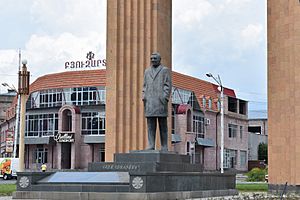
Honors and Awards
- Knight of the French Legion of Honour: 1989
- Officer of the French Legion of Honour: 1997
- Commander of the French Legion of Honour: 2003
- Officer in the French Order of Merit: 1986
- Commander in the French Order of Merit: 2000
- Commander of the Ordre des Arts et des Lettres: 1997
- National Hero of Armenia: 2004
- Officer in the Belgian Order of Leopold II: 2004
- Commander in the Belgian Order of the Crown: 2015
- Officer in the Order of Canada: 2008
- Officer in the National Order of Quebec: 2009
- Japanese Order of the Rising Sun: 2018
- Medal of the City of Paris: 1969
- Grand Medal of the French Academy: 1995
- Citizenship of Armenia
- Queen Elizabeth II Diamond Jubilee Medal: 2012
- Raoul Wallenberg Medal: 2017
- Best Actor Award from the French Cinema Academy for his role in La Tête contre les murs: 1959
- Edison Awards (three times): 1963, 1971, 1980
- First Prize for French Song in Japan for La Mamma: 1964
- American Society of Songwriters Award: 1969
- Golden Lion Honorary Award at the Venice Film Festival: 1971
- Ambassador of Goodwill and Permanent Delegate of Armenia to UNESCO: 1995
- Inducted into the Songwriters Hall of Fame: 1996
- French Victoire award for Male Artist of the Year: 1997
- Honorary César Award: 1997
- MIDEM Lifetime Achievement Award: 2009
- Honorary Doctorate from the University of Montreal: 2009
- Honorary order from Russia "For contributing to strengthening cultural relations between Russia and France": 2010
- Special Prize of the "Hayak" National Film Awards in Armenia for "his great contribution to world cinema": 2014
- Honorary Award at the NRJ Music Awards: 2015
- Star on the Hollywood Walk of Fame: 2016
Images for kids
-
Aznavour at the 1999 Cannes Film Festival
See also
 In Spanish: Charles Aznavour para niños
In Spanish: Charles Aznavour para niños
- List of best-selling music artists
- Armenia–France relations
 | John T. Biggers |
 | Thomas Blackshear |
 | Mark Bradford |
 | Beverly Buchanan |


